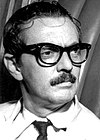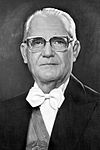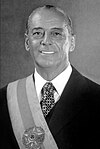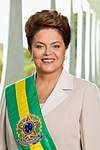List of presidents of Brazil
| This article is part of a series on the |
 |
|---|
This is a list of presidents of Brazil. For a complete list of Brazilian heads of state, see also the list of Brazilian monarchs.
The old republic (1889–1930)
In 1889 the Empire of Brazil was abolished and replaced with a Republic in a coup d'état led by Marshal Deodoro da Fonseca, who deposed the Brazilian Emperor Dom Pedro II, proclaimed Brazil a Republic and formed a provisional government. Two years later, in 1891, a constitution was adopted, based on the federal republic of the United States of America; the country itself was named the Republic of the United States of Brazil. In accordance with the provisions of the Constitution, the presidents of the Republic were to be elected by direct popular ballot, but, for the first presidential term, the president and vice-president would be chosen by the Constituent Congress; the Constituent Congress was to elect the first president and vice-president immediately after the promulgation of the Constitution. In accordance with those transitional provisions, Congress elected Deodoro the first president of the Republic. His inauguration took place on 26 February 1891, only two days after the promulgation of the Constitution. Deodoro resigned the presidency ten months later after a coup d'état in which he dissolved Congress was reversed. Then, Floriano Peixoto, Deodoro's vice-president and an opponent of the coup, was inaugurated. In 1894, Peixoto was succeeded by Prudente de Morais, the first president of Brazil to be elected by direct popular ballot. De Morais, who was the first president to be elected under the permanent provisions of the Constitution adopted in 1891, was also the first civilian to hold the office of president.
Although it was theoretically a constitutional democracy, the Old Republic was characterized by the power of regional oligarchies and the strict alternation of power between the states of São Paulo and Minas Gerais. The vote in the countryside was often controlled by the local land owner, and less than 6% of the population had the right to vote due to literacy requirements.
In 1930, when Brazil was suffering the effects of the Wall Street Crash of 1929, a revolution broke out in the country and the old republic ended. The president Washington Luís, who was supported by São Paulo oligarchies, broke the rule of alternation between São Paulo and Minas and supported a candidate who was also from São Paulo, Júlio Prestes. Prestes won the rigged election, but Washington Luís was deposed three weeks before the end of his term and Prestes was never inaugurated.
- Parties
None (military) Federal Republican Party São Paulo Republican Party Mineiro Republican Party Rio Republican Party Republican Conservative Party
| # | President | Picture | Elected | Took office | Left office | Political Party | Vice President(s) |
|---|---|---|---|---|---|---|---|
| 1 | Deodoro da Fonseca |  |
1891 | (Head of the Provisional Government since 15 November 1889) 26 February 1891 |
23 November 1891[1] | None (military) | Floriano Peixoto |
| 2 | Floriano Peixoto |  |
— | 23 November 1891 | 14 November 1894 | None (military) | vacant |
| 3 | Prudente de Morais |  |
1894 | 15 November 1894 | 14 November 1898 | Federal Republican Party (PR Fed) | Manuel Vitorino (PR Fed) |
| 4 | Campos Sales |  |
1898 | 15 November 1898 | 14 November 1902 | São Paulo Republican Party (PRP) | Rosa e Silva |
| 5 | Rodrigues Alves |  |
1902 | 15 November 1902 | 14 November 1906 | São Paulo Republican Party (PRP) | Silviano Brandão (PRM) |
| Afonso Pena (PRM) | |||||||
| 6 | Afonso Pena |  |
1906 | 15 November 1906 | 14 June 1909[2] | Mineiro Republican Party (PRM) | Nilo Peçanha (PRF) |
| 7 | Nilo Peçanha |  |
— | 14 June 1909 | 14 November 1910 | Rio Republican Party (PRF) | vacant |
| 8 | Hermes da Fonseca | 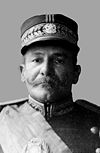 |
1910 | 15 November 1910 | 14 November 1914 | Conservative Republican Party (PRC) | Venceslau Brás (PRM) |
| 9 | Venceslau Brás | 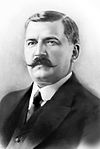 |
1914 | 15 November 1914 | 14 November 1918 | Mineiro Republican Party (PRM) | Urbano Santos |
| – | Rodrigues Alves |  |
1918 | Never took office.[3] | São Paulo Republican Party (PRP) | Delfim Moreira (PRM) | |
| 10 | Delfim Moreira | 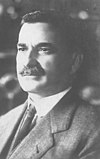 |
— | (Acting president from 15 November 1918) 16 January 1919 |
28 July 1919[4] | Mineiro Republican Party (PRM) | vacant |
| 11 | Epitácio Pessoa |  |
1919 | 28 July 1919[5] | 14 November 1922 | Mineiro Republican Party (PRM) | Delfim Moreira (PRM) |
| Bueno de Paiva[6] (PRM) | |||||||
| 12 | Artur Bernardes |  |
1922 | 15 November 1922 | 14 November 1926 | Mineiro Republican Party (PRM) | Estacio Coimbra |
| 13 | Washington Luís |  |
1926 | 15 November 1926 | 24 October 1930[7] | São Paulo Republican Party (PRP) | Melo Viana (PRM) |
| – | Júlio Prestes |  |
1930 | Never took office.[8] | São Paulo Republican Party (PRP) | Vital Soares | |
Vargas era (1930–1946)
- Parties freedom deeply suppressed
Liberal Alliance
| # | President | Picture | Took office | Left office | Political Party | Vice President(s) |
|---|---|---|---|---|---|---|
| – | Augusto Fragoso, Isaías de Noronha, and Mena Barreto |
 |
24 October 1930 | 3 November 1930 | None (provisional military junta) |
vacant |
| 14 | Getúlio Vargas[9] |  |
(Head of the Provisional Government since 3 November 1930) 20 July 1934 |
29 October 1945 | Liberal Alliance (AL) | vacant[10] |
| 15 | José Linhares |  |
29 October 1945 | 31 January 1946 | None[11] (President of the Supreme Federal Court) |
vacant |
The second republic (1946–1964)
In 1945, Vargas was deposed by a military coup led by two ex-supporters. Nevertheless, he would be elected president once again and his influence in Brazilian politics would remain until the end of the second republic. In this period, three parties dominated the national politics. Two were pro-Vargas – in the left, PTB and in the center-right, PSD – and another anti-Vargas, the rightist UDN.
This period was very unstable. In 1954, Vargas committed suicide during a crisis that threatened his government and he was followed by a series of short-term presidents. In 1961, UDN won national elections for the first time, supporting Jânio Quadros, who himself was a member of a minor party allied to UDN. Quadros, who, before his election, rose meteorically in politics with an anti-corruption stance, unexpectedly resigned the presidency seven months later. Some historians suggest that Quadros was heavily drunk when he signed his resignation letter, while others suggest that Quadros felt that Congress would not accept his vice-president as president, and would ask for his return. Those historians, therefore, see Quadros' resignation as an attempt to return to office with increased powers and more political support. It is possible that both occurred: Quadros was drunk when he resigned, and in that state, he devised the plan to return to power by Congressional request. The plot failed: Congress simply received Quadros' letter, and amid the shock of politicians and of the Nation, the letter was entred into the records of Congress and the presidency was declared vacant. The president of Congress, Senator Auro de Moura Andrade, took the view that the deed of resignation was the province of the elected president, that it was not subject to a congressional vote, needing no confirmation, and that the president's declaration of resignation was final.
In that time, the president and the vice-president were voted separately. The vice-president was a political enemy of Jânio Quadros, the leftist João Goulart. Goulart was out of the country, and Congress was controlled by right wing politicians. During Goulart's absence, the president of the Chamber of Deputies, Ranieri Mazzilli, took office as acting president. There was then a plot to block the inauguration of the vice-president as president, but Congressional resistance to the inauguration of Goulart led to a reaction by the Governor of Rio Grande do Sul, who led a "legality campaign", and to a split in the military (that, during the second Republic, intervened heavily in politics). Amid the political crisis, the solution was the adoption by Congress of a Constitutional Amendment abolishing the presidential Executive and replacing it with a parliamentary system of Government. Under that negotiated solution, Goulart's inauguration was allowed to proceed, but Goulart would be Head of State only, and a prime minister approved by Congress would lead the government. The new system of government's continued existence was subject to popular approval in a referendum scheduled for 1963. The result of this referedum restored the presidential Executive and a military coup deposed Goulart in 1964, starting the military dictatorship.
- Parties
Social Democratic Party Brazilian Labour Party (historical) National Labour Party
The military regime (1964–1985)
Social Democratic Party (abolished 1965)
- Parties abolished, except for
National Renewal Alliance (later Democratic Social Party) Brazilian Democratic Movement
The new republic (1985–present)

In the early 1980s the military government started a process of gradual political opening, called abertura, the final goal of which was democracy. When the term of the last military president was to end, however, no direct elections for president took place. For the election of the country's first civilian president since the military coup of 1964, the military maintained the rule that prevailed during the dictatorial regime, according to which an Electoral College made up of the entire National Congress and representatives from State Assemblies was to elect the president. This time, however, the Military placed the Electoral College under no coercion, so that its members would be free to select the president of their choice.
The Chamber of Deputies and the State Assemblies had been elected, already under the abertura process in the 1982 parliamentary election, but the Senators were chosen indirectly, by the State Assemblies, under rules that had been passed by the Military Regime in 1977 to counter the growing support of the opposition: one third of the Senators was chosen in 1982, and two thirds had been chosen in 1978. After the 1982 elections, the ruling party, PDS (the successor of the ARENA), still controlled a majority of the seats in the National Congress.
Tancredo Neves, who had been prime-minister during the presidency of João Goulart, was chosen to be the candidate of PMDB, the major opposition party (and the successor of the MDB Party, that had opposed the Military Regime since its inception), but Tancredo was also supported by a large political spectrum, even including a significant part of former members of ARENA, the party that supported the military presidents. In the last months of the military regime, a large section of ARENA members defected from the Party, and now professed to be men of democratic inclinations. They formed the Liberal Front, and the Liberal Front Party allied itself to PMDB, forming a coalition known as the Democratic Alliance. PMDB needed the Liberal Front's support in order to secure victory in the Electoral College. In the formation of this broad coalition former members of ARENA also switched parties and joined PMDB. So, to seal this arrangement, the spot of vice-president in Tancredo Neves' ticket was given to José Sarney, who represented the former supporters of the regime that had now joined the Democratic Alliance.
On the other hand, those who remained loyal to the military regime and its legacy renamed ARENA as the PDS. In the PDS's National Convention, two right-wing supporters of the military administrations fought for the Party's nomination: Colonel Mário Andreazza, then Minister of the Interior in General Figueiredo's administration, was the preferred candidate of the incumbent President and of the military elite, but he was defeated by Paulo Maluf, a civilian and former Governor of São Paulo State. Tancredo's coalition defeated Maluf, and his election was hailed as the dawn of a New Republic. Andreazza's defeat (by 493 votes to 350) and the selection of Maluf as the PDS's presidential canditate greatly contrubited to the split in the Party that led to the formation of the Liberal Front. The Liberal Front refused to support Maluf and joined forces with the PMDB in supporting Tancredo Neves, thus forging the Democratic Alliance. Without that split in the PDS, the election of the opposition candidate would not have been possible.
Although elected president, Tancredo Neves became gravely ill on the eve of his inauguration and died without ever taking office. Therefore, the first civilian president since 1964 was Tancredo's running mate, José Sarney, himself an ex-member of ARENA. José Saynery's administration fulfilled Tancredo's campaign promise of passing a constitutional amendment to the Constitution inherited from the military regime, so as to summon elections for a National Constituent Assembly with full powers to draft and adopt a new Constitution for the country, to replace the authoritarian legislation that still remained in place. In October 1988, a new democratic Constitution was passed, and democracy was consolidated.
In 1989, the first elections for president under the new Constitution were held and the young Fernando Collor was elected for a five-year term - the first president to be elected by direct popular ballot since the military coup. He was inaugurated in 1990 and in 1992 he became the first president in Brazil to be impeached due to corruption. A Constitutional Amendment passed in 1993 reduced the presidential term of office from five to four years.
In 1995, Fernando Henrique Cardoso was inaugurated for a four-year term. In 1997 a Constitutional Amendment was passed allowing presidents of Brazil to be reelected to one consecutive term. In 1998, then President Fernando Henrique Cardoso became first president of Brazil to be reelected for an immediately consecutive term. In 2003 Luiz Inácio Lula da Silva was inaugurated. He was reelected in 2006. In 2011 Dilma Rousseff became Brazil's first woman president.
- Parties
Brazilian Democratic Movement Party
Party of the National Reconstruction
Brazilian Social Democratic Party
Liberal Front Party
Workers' Party
Brazilian Republican Party
Notes
- ^ In a coup d'état on 3 November 1891, he shut down the National Congress and ruled by decree for a few weeks. There was a reaction of those loyal to the Constitution and Deodoro was forced to resign the presidency. His dissolution of Congress and his acts since the coup were considered null and void. Upon Deodoro's resignation on 23 November 1891, Vice-President Floriano Peixoto succeeded to the Presidency.
- ^ Died in office. Upon Afonso Pena's death on 14 June 1909, Vice-President Nilo Peçanha became President and finished the 1906-1910 presidential term.
- ^ Rodrigues Alves, who had been the 5th President of Brazil (1902-1906), was elected to serve as the 10th President in 1918 but fell ill with the Spanish Flu before his inauguration, so that he was not able to attend it. His running-mate, Delfim Moreira took office as vice-president and became acting president. Rodriges Alves never took the oath of office to become the 10th President, as he did not recover from his illness and died. Delfim Moreira succeeded to the Presidency upon the President-elect's death in January 1919.
- ^ Vice-President Delfim Moreira succeeded to the Presidency upon the death of President-elect Rodrigues Alves, but, in accordance with the constitutional provisions then in force, since the vacancy of the presidency occurred in the first half of the four-year presidential term, new elections were summoned and Delfim Moreira served only until an elected President was chosen and inaugurated to finish the 1918-1922 presidential term.
- ^ Rodrigues Alves died on 16 January 1919. The extraordinary election summoned in accordance with the Constitution was held on 13 April 1919. Elected to finish the remainder of the 1918-1922 presidential term, Epitácio Pessoa took office on 28 July 1919. Upon the inauguration of President Epitácio Pessoa, Delfim Moreira ceased to be President, and returned to the office of Vice-President.
- ^ Vice-President Delifim Moreira died on 1 July 1920. The Vice-Presidency remained vacant until a new Vice-President was elected and inaugurated. Bueno de Paiva took office as Vice-President on 11 November 1920 to complete the remainder of the 1918-1922 term of office.
- ^ Deposed by the 1930 Revolution. Upon his overthrowal, a provisional military junta seized power; days later that military triumvirate would cede full authority to Getúlio Vargas, the leader of the revolutionary movement, who formed a provisional government.
- ^ Júlio Prestes, elected on 1 March 1930, never took office due to the 1930 coup that deposed his predecessor Washington Luís.
- ^ Getúlio Vargas was de facto President of Brazil from 3 November 1930 to 20 July 1934, as head of the provisional government. On July 17, 1934, he was elected President of Brazil by the National Constituent Assembly, taking office three days later. On 10 November 1937, he led a coup d'état and proclaimed the Estado Novo dictatorship, extending his term until 29 October 1945, when he was deposed by the military.
- ^ The office of Vice-President was abolished during Vargas' tenure.
- ^ José Linhares, President of the Supreme Court, took office after he was summoned by the Armed Forces, once his predecessor had been deposed.
- ^ Vargas committed suicide on 24 August 1954. Upon his death, Vice-President Café Filho succeeded to the presidency.
- ^ a b Declared himself temporarily unable to govern for medical reasons. His self declared incapacity led to the assumption of the presidency by Carlos Luz (who was President of the Chamber of Deputies) as acting president. Carlos Luz was seen as hostile to the inauguration of the then-president elect, Juscelino Kubitschek. Fearing that Carlos Luz would lead a coup to prevent the inauguration of the president-elect, a section of the military deposed him, and installed the President of the Senate, Nereu Ramos, as acting president of the Republic in his stead. Upon the deposition of Carlos Luz from the post of acting president, President Café Filho attempted to terminate his self-declared incapacity, but was prevented from resuming the powers and duties of the presidency by the same military faction that had installed Nereu Ramos as acting president.
- ^ Deposed.
- ^ President of the Senate. Summoned by the Minister of the Army, Marshall Henrique Teixeira Lott, who led the coup to overtrow Carlos Luz, Senator Nereu Ramos assumed the presidency after Luz's deposition. Although President Café Filho was not formally deposed, the same military establishment that had deposed Carlos Luz blocked President Café Filho from resuming the powers and duties of the presidency. Café Filho attempted to obtain an injunction from the Supreme Federal Court, but the Court refused to interfere in the political question. Accordingly, Nereu Ramos remained in office until the inauguration of President-elect Kubitschek.
- ^ Resigned from office on 25 August 1961.
- ^ Acting president following Quadros' resignation. Vice-President João Goulart was on an official visit to China, and only took office on 7 September 1961.
- ^ Goulart was on an official visit to China when Quadros resigned the presidency. While the Vice-President was still abroad, there was an attempt on the part of the Vice-President's opponents, who controlled Congress, to prevent him from being inaugurated, but that movement failed, due to resistance by the Governor of the State Rio Grande do Sul and a split in the military. However, Congress only allowed the inauguration of Goulart to proceed after a compromise was reached, whereby a Constitutional Amendment severely limiting the powers of the presidency was passed on 2 September 1961. Under that Constitutional Amendment, the presidential Executive, that had existed since the proclamation of the Republic, was abolished and replaced with a parliamentary system, in which a prime minister was the head of the Government, and the President retained only the role of head of State. The Amendment however stipulated that the constitutional change would only become permanent if confirmed by the people in a referendum. On 6 January 1963 that referendum was held, and a majority of the voters rejected the Amendment, backing the restoration of the presidential Executive instead. According to the result of the referendum, on 23 January 1963 a new Constitutional Amendment was promulgated, reppealing the 1961 Amendment and re-establishing the presidential Executive as it existed immediately prior to that Amendment. Thus, from 7 September 1961 until 23 January 1963 President Goulart served as head of State only, in a parliamentary system of Government, and, from 23 January 1963 onwards, he served as both Head of State and Head of Government.
- ^ Deposed by the military coup of 1964.
- ^ Following the 1964 military coup, the President of Congress, Senator Auro de Moura Andrade convened a joint session of Congress and summarily announced that President João Goulart was deposed. Moura Andrade then declared Ranieri Mazzilli (who then was the President of the Chamber of Deputies and the first person in the presidential line of succession) to have succeeded to the office of President of the Republic. Accordingly, Mazzili assumed the office of President on 1 April 1964. On 9 April 1964, a body known as the Supreme Command of the Revolution, composed of the leaders of the military coup (the commanders of the three branches of the Armed Forces), issued an Institutional Act summoning the National Congress to elect a new President in 48 hours. The military then put forward the name of Marshal Castelo Branco. Ranieri Mazzili, therefore, remained as President only up to the election and inauguration of Castelo Branco.
- ^ Alkmin was a PSD member; when the PSD was abolished in 1965, he joined ARENA
- ^ A military junta composed of the Ministers in charge of the three brances of the Armed Forces assumed the powers of the presidency on 31 August 1969 after President Costa e Sliva suffered a cerebral trombosis that left him completely incapacitated. The military junta seized power so as to prevent Vice-President Pedro Aleixo, a civilian, from becoming acting president. The possibility of a civilian, even a conservative one, assuming the powers of the presidency was seen as detrimental to the continuity of the military regime. In the initial stage of the President's disease, the junta hoped that he would recover. Subsequently, realizing that the President's condition was irreversible, and that the prolongued continuity of a triumvirate was detrimental to the regime and to its image, the military junta issued an institutional act on 14 October 1969 removing the incapacitated President and the Vice-President from office and summoning Congress to elect a new President and Vice-President. The military elite that controlled the regime then selected General Emílio Garrastazu Médici to be ARENA's candidate, and his name was rubber-stamped by Congress. The junta remained in place until the new President was sworn-in. Brazilian Federal Law number 12.486, promulgated on 12 September 2011 posthumously recognizes the illegality of the act that prevented Vice-President Pedro Aleixo from becoming acting president and that removed him from office, and directs that he be deemed and taken as a former President of the Republic for all legal purposes. Costa e Silva died less than three months after his removal, and were it not for the military acts now declared illegal that removed him from the Vice-Presidency, Pedro Aleixo would have succeeded to the Presidency.
- ^ Died before taking office. Tancredo Neves became gravely ill on the eve of his own inauguration, so that he could not attend it. José Sarney, his running mate, took office as Vice-President and served as acting president from the day of Neves' would-be inauguration to the day he died. Upon Neves' death on 21 April 1985, Acting President Sarney succeeded to the presidency. On the first anniversary of Neves' death a statute was signed into Law (federal law 7.465/1986), establishing that Tancredo Neves "elected but not sworn-in due to his death" should be included in the gallery of the Presidents of Brazil "for all legal purposes".
- ^ Impeached by the Chamber of Deputies. Upon the acceptance of the charges of impeachment, President Collor was suspended from office for 180 days in accordance with the Constitution and the Vice-President became acting president. On the final day of his trial of impeachment before the Brazilian Federal Senate, Collor resigned the presidency, in an attempt to stop the process. Acting President Itamar Franco was then sworn-in as President. The trial of impeachment continued in spite of Collor's resignation and he was found guilty of the charges and disqualified for holding public office for eight years.
- ^ a b Itamar Franco joined the PRN for the 1989 election to run as Collor's running mate. In office, he broke with Collor, and left the PRN on 5 May 1992, returning to the PMDB.






